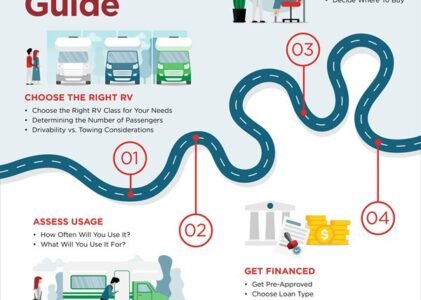Picture this: The open road stretches out before you, beckoning you to embark on a grand adventure. The wind whips through your hair as you journey from one breathtaking destination to another. But before you can hit the road, there’s one important decision you need to make: choosing the perfect RV for your needs. With so many options out there, it can feel overwhelming. But fear not! In this article, we’ll guide you through the process of finding the RV that’s just right for you, ensuring that your road trip dreams become a reality.
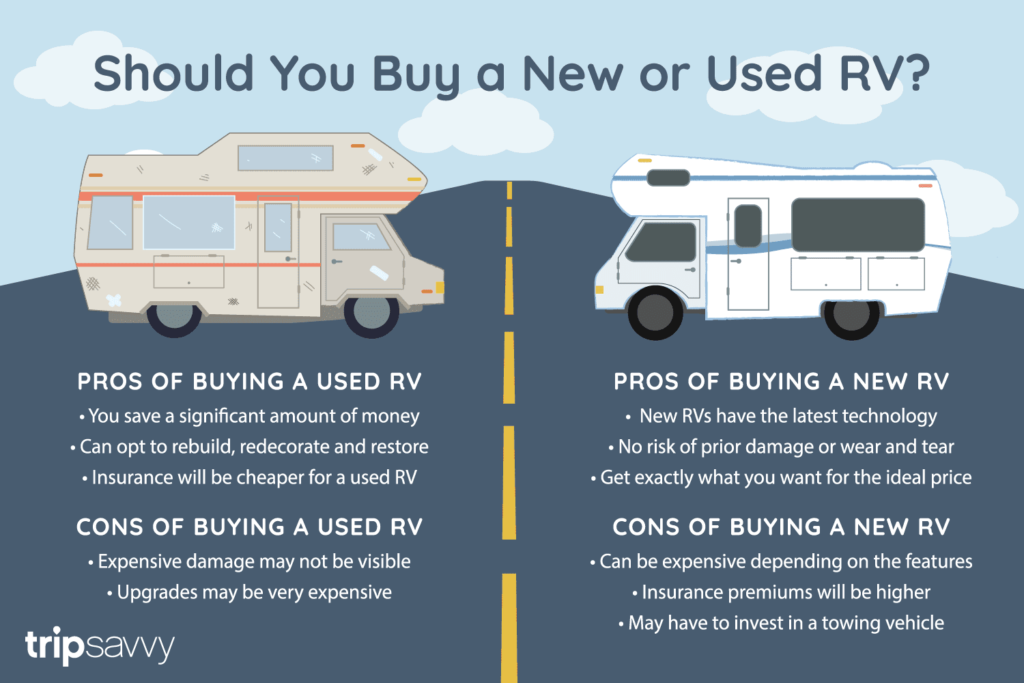
Understanding Your Needs
When it comes to choosing the perfect RV for your needs, there are a few important factors to consider. Understanding your needs and preferences is the first step in finding the ideal recreational vehicle that will accommodate your lifestyle and bring you the most enjoyment during your adventures. Let’s delve into each aspect that you should take into account.
Determining your travel preferences
Before diving into the world of RVs, take some time to think about your travel preferences. Are you someone who enjoys weekend getaways to nearby campsites, or are you planning on embarking on longer cross-country trips? Understanding the type and duration of your travel will help you narrow down your options when it comes to choosing an RV.
Considering the number of occupants
Another vital consideration is the number of occupants that the RV will need to accommodate. Are you planning on traveling solo, or will you be bringing along family or friends? Determining the number of people that will be joining you on your RV adventures will help you choose a size and layout that can comfortably accommodate everyone.
Thinking about duration of trips
Next, consider the duration of your trips. Are you planning on taking short trips where you’ll mainly use the RV for sleeping and dining, or are you looking for a more spacious and comfortable setup for longer journeys? Understanding the duration of your trips will influence the amenities and space requirements you should prioritize in your RV choice.
Evaluating desired amenities
What amenities are must-haves for you? Are you looking for a fully-equipped kitchen, a spacious bathroom, or perhaps a luxurious entertainment system? Make a list of the amenities that are important to you and prioritize them based on your needs and preferences. This will help you focus on RV models that offer the features you desire.
Analyzing storage requirements
Last but not least, consider your storage requirements. Do you need ample storage space for outdoor equipment such as bikes or kayaks? How about interior storage for personal belongings? Assessing your storage needs will ensure that you choose an RV that can accommodate all your essentials and outdoor gear.
Types of RVs
Now that you have a clearer understanding of your needs, let’s explore the different types of RVs available on the market. Each type has its own unique features and advantages, so it’s important to familiarize yourself with them to make an informed decision.
Motorhomes
Motorhomes, also known as RVs or motor coaches, are a popular choice for many RV enthusiasts. These vehicles are built on a motorized chassis and offer a convenient all-in-one setup. Motorhomes come in different classes, such as Class A, Class B, and Class C, each offering varying sizes, amenities, and price ranges. Class A motorhomes are the largest and most luxurious, resembling a bus, while Class B and Class C motorhomes offer smaller, more maneuverable options.
Travel Trailers
Travel trailers are towed behind a separate vehicle and offer a range of sizes and features. They can be detached from the towing vehicle, allowing you to use your vehicle for daily transportation without the need to bring the entire RV along. Travel trailers come in various floor plans and offer amenities similar to motorhomes, including kitchens, bathrooms, and sleeping quarters.
Fifth Wheels
Fifth wheels are a type of travel trailer that attach to a hitch mounted in the bed of a pickup truck. These RVs offer increased stability and ease of towing compared to traditional travel trailers. Fifth wheels often have multiple levels and provide additional living space, making them a popular choice for those looking for extra comfort and a home-like feel.
Pop-Up Campers
Pop-up campers, also known as tent trailers, are a lightweight and affordable option for those who enjoy camping but desire some additional comforts. These RVs feature collapsible living quarters that can be expanded once you reach your camping destination. Pop-up campers are easy to tow and store, making them a convenient choice for those who want a hassle-free camping experience.
Truck Campers
Truck campers are designed to be loaded onto the bed of a pickup truck, creating a compact and versatile RV setup. These campers provide a sleeping area, kitchenette, and bathroom facilities, all supported by the truck’s engine and amenities. Truck campers offer flexibility and maneuverability, ideal for those who want to explore off-grid locations and enjoy outdoor activities.
Nominal vs. Full-Time Use
Before making a final decision on your RV, consider whether you will be using it for occasional trips or as your primary residence. This distinction is important as it will influence the type of RV and the features you should prioritize.
Considering occasional or regular usage
If you’re planning on using your RV for occasional trips, such as weekend getaways or seasonal vacations, you can focus on models that are designed for part-time use. These RVs often offer a good balance between comfort and affordability, making them a practical choice for recreational use.
Determining if it will be your primary residence
On the other hand, if you’re considering living in your RV as your primary residence, it’s important to choose a model that is specifically designed for full-time use. These RVs typically offer more space, enhanced insulation, and durable construction to withstand regular use. Additionally, they often include features that contribute to long-term comfort and convenience, such as larger freshwater and wastewater tanks.
Budget Considerations
Setting a realistic budget is a crucial step in the RV selection process. RVs come in a wide range of prices, so it’s important to determine how much you’re willing to spend and find a balance between your desired features and your financial capacity.
Setting a realistic budget
When setting your budget, take into account not only the initial purchase price of the RV but also other costs associated with RV ownership, such as insurance, maintenance, and campground fees. Having a clear understanding of your financial limits will help you narrow down your options and focus on RVs that fall within your budget range.
Factoring in maintenance and operation costs
In addition to the purchase price, it’s essential to consider ongoing maintenance and operation costs. RVs require regular servicing, which includes engine maintenance, fluid changes, and inspections. You’ll also need to budget for fuel expenses, campground fees, and potential repairs. It’s important to be prepared for these costs before diving into RV ownership.
Researching financing options
If purchasing an RV outright is not feasible for you, there are various financing options available to help you spread the cost over time. Research different financing providers and compare interest rates and terms to find the best option for your specific situation. Taking the time to explore financing options will ensure that you make a financially sound decision.
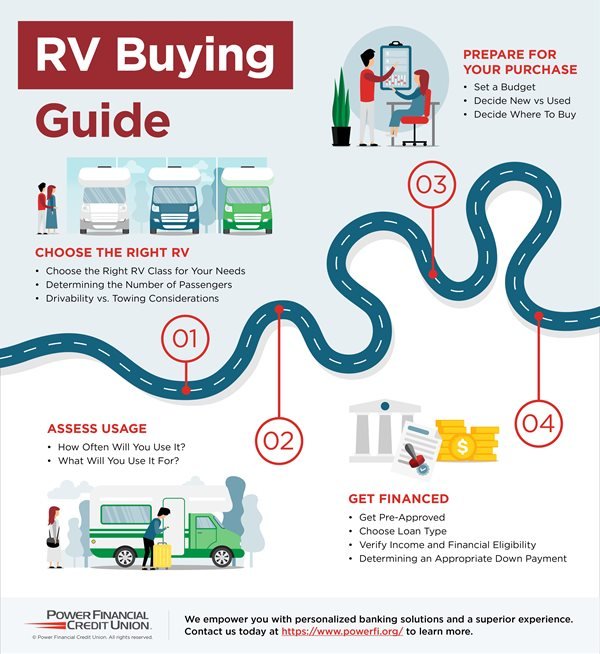
Size and Space Requirements
The size and space of your RV are essential considerations as they directly impact your comfort and enjoyment while on the road. Consider the following factors to determine the appropriate size and space for your needs.
Choosing the appropriate length
RVs come in different lengths, ranging from compact models to larger options. When choosing the length of your RV, consider factors such as maneuverability, parking restrictions, and campsite limitations. Longer RVs may offer more space, but they can be more challenging to maneuver and may be restricted from certain camping areas.
Evaluating interior floor plan options
The interior floor plan is another crucial aspect to evaluate when choosing an RV. Consider how you plan to use the space and whether the layout meets your needs. Look for features such as comfortable seating areas, functional kitchen and bathroom layouts, and sufficient storage space. Visualize yourself living in the RV and envision how the floor plan will fit your lifestyle.
Assessing sleeping arrangements
Evaluate the sleeping arrangements offered by different RV models to ensure that they can accommodate your needs. Consider the number of beds, their sizes, and the overall comfort they provide. Some RVs offer convertible sleeping areas, allowing you to utilize the space efficiently during the day and convert it into a cozy sleeping area at night.
Towing or Driving
Another decision to make when choosing an RV is whether you prefer towing a trailer or driving a motorized RV. Each option has its pros and cons, and your personal preferences and driving capabilities will influence your choice.
Deciding between towable and motorized RVs
Towable RVs, such as travel trailers and fifth wheels, require a separate vehicle to tow them. This offers the advantage of being able to use the towing vehicle for other purposes when not traveling. Motorized RVs, like motorhomes, allow for more convenience as they combine the driving and living space in a single unit.
Considering your towing capacity (if applicable)
If you’re considering a towable RV, it’s important to determine your towing capacity. This refers to the maximum weight your vehicle can safely tow. Exceeding the towing capacity can lead to safety hazards and cause damage to your vehicle. Check your vehicle’s specifications or consult with a professional to ensure that your towing capacity matches the RV you intend to purchase.
Understanding driving and maneuverability factors
When it comes to driving an RV, it’s essential to understand the driving and maneuverability factors associated with each type. Motorhomes can be larger and require more skill to handle, while towable RVs can present challenges when it comes to backing up and making tight turns. Consider your confidence level and experience in driving larger vehicles before making a decision.
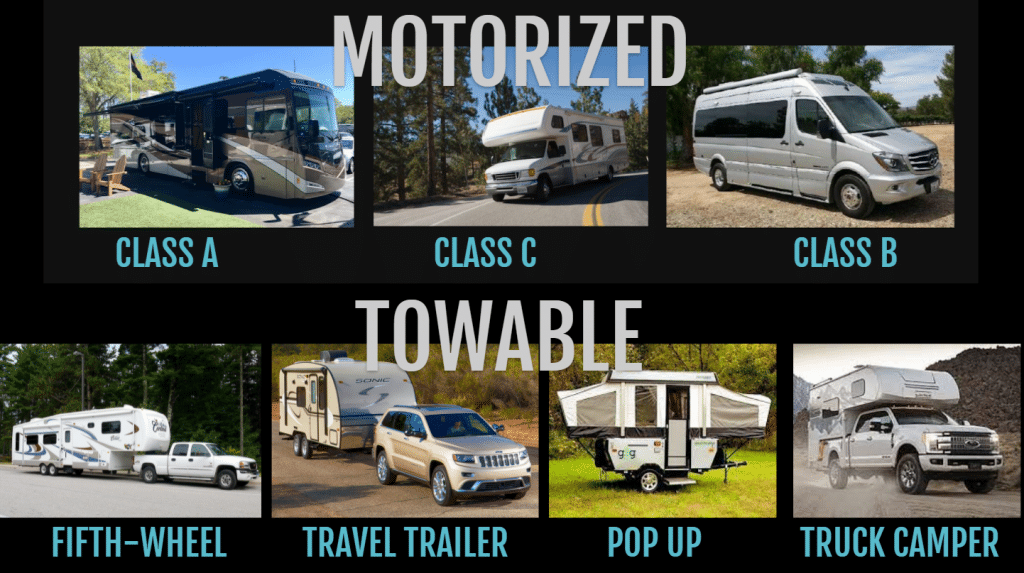
Luxury and Convenience Features
If luxury and convenience are high on your list of priorities, there are a variety of high-end amenities to consider when choosing an RV. These features can enhance your overall comfort and make your RV trips feel like a luxurious home away from home.
Exploring high-end amenities
Luxury RVs often come equipped with high-end amenities such as high-quality kitchen appliances, spacious bathrooms, stylish interior designs, and state-of-the-art entertainment systems. Some models even offer features like heated floors, fireplaces, and advanced technology integration. Exploring the range of high-end amenities available will help you determine which features are essential to your RVing experience.
Determining must-have features
While luxury amenities are appealing, it’s important to determine which features are must-haves for you. Consider your lifestyle and preferences to identify the features that will enhance your RV adventures. For some, a comfortable sleeping area and ample storage space might be non-negotiable, while for others, a well-equipped kitchen or a high-quality sound system might take precedence.
Considering optional upgrades
Many RV manufacturers offer optional upgrades and customization options, allowing you to tailor your RV to your specific needs and tastes. From upgraded appliances and superior electronics to premium interior finishes and additional storage features, optional upgrades can further enhance the luxury and convenience of your RV. Take the time to explore these options and consider how they align with your desires and budget.
Fuel Efficiency and Mileage
Fuel efficiency and mileage are important considerations, especially for those planning on embarking on long trips or spending an extended amount of time on the road. Understanding the fuel consumption of different RV models will help you budget for fuel costs and choose an option that aligns with your priorities.
Comparing various RV models
Different RV models vary in terms of fuel efficiency and mileage. Class A motorhomes, for example, tend to have lower fuel efficiency due to their larger size and weight, while Class B motorhomes and smaller towable RVs are generally more fuel-efficient. It’s important to take these factors into account and compare the fuel consumption of different models to determine the best fit for your needs.
Evaluating fuel consumption
Consider the fuel consumption of the RV models you’re interested in and evaluate how it aligns with your budget and travel plans. Calculate the estimated fuel costs based on the distance you plan to travel and the current fuel prices. Keep in mind that fuel efficiency can also depend on factors such as driving habits, terrain, and whether you’re towing a vehicle.
Considering alternative fuel options
If fuel efficiency is a top priority for you, consider exploring RV models that offer alternative fuel options. Some manufacturers offer RVs that run on diesel fuel, which can provide better mileage and longevity. Additionally, there are electric and hybrid RV options emerging in the market, offering environmentally friendly alternatives. However, it’s important to consider the availability of fueling stations and charging infrastructure when opting for alternative fuel options.
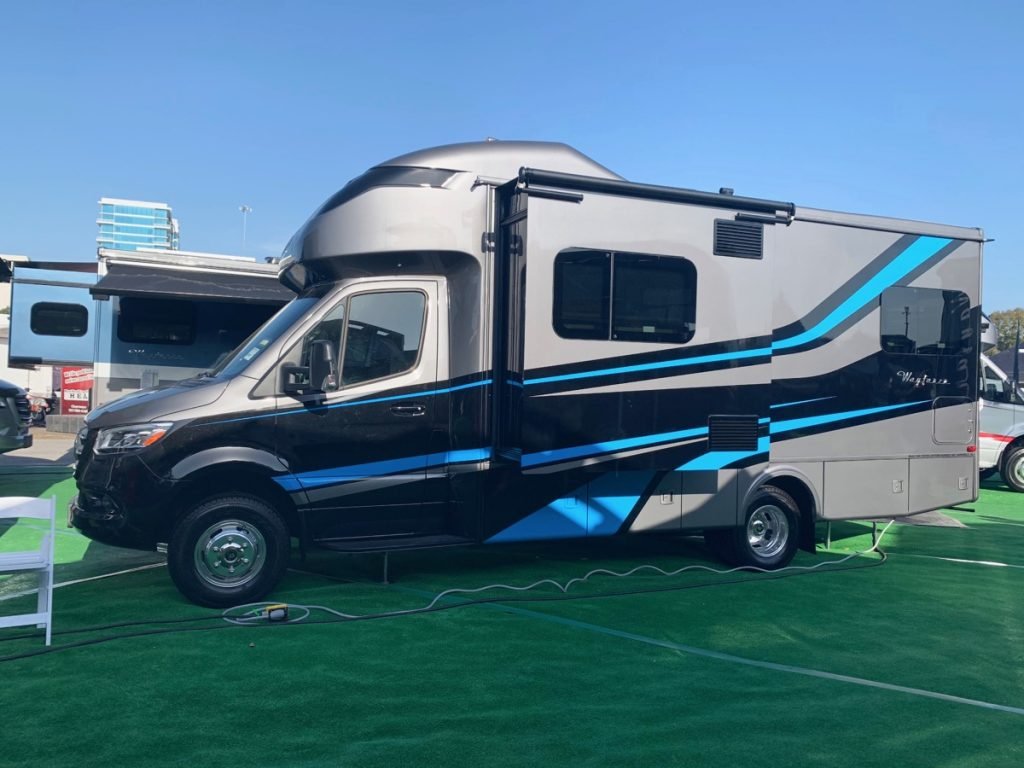
Maintenance and Repairs
Understanding the maintenance and repair requirements of RVs is crucial, as it will directly impact your long-term ownership experience. Consider these factors to ensure that you’re prepared for the upkeep of your chosen RV.
Understanding required maintenance
Like any vehicle, RVs require regular maintenance to ensure their optimal performance and longevity. This includes servicing the engine, checking fluid levels, inspecting the chassis, and maintaining various interior and exterior components. Familiarize yourself with the manufacturer’s recommended maintenance schedule and be prepared to invest time and resources into keeping your RV in top shape.
Researching repair costs
In addition to regular maintenance, RVs may require occasional repairs due to wear and tear or unforeseen issues. Research common repair costs for the specific RV models you’re considering and budget accordingly. Keep in mind that repairs on motorized RVs can often be more expensive than those on towable options due to the complexity of the engine and other systems.
Considering warranty options
To protect yourself from unexpected repair expenses, consider purchasing an extended warranty for your RV. An extended warranty can provide coverage for mechanical breakdowns and help alleviate the financial burden of major repairs. Research different warranty providers and compare coverage, terms, and costs to find the best option for your needs. Keep in mind that some RV manufacturers offer their own warranties, so be sure to inquire about these options as well.
Resale Value and Depreciation
While it may not be at the forefront of your mind when purchasing an RV, considering the resale value and depreciation of different models is essential if you plan on upgrading or selling your RV in the future.
Looking at historical resale values
Research historical resale values to get an idea of how different RV models retain their value over time. Some models from reputable manufacturers tend to hold their value better than others, which can be advantageous if you plan on selling or trading in your RV down the line. Take into account the reputation of the manufacturer and the overall demand for specific models in the used RV market.
Considering the impact of depreciation
RVs, like any other vehicle, experience depreciation over time. Their value decreases as they age, and factors such as mileage, condition, and market demand can significantly impact their resale value. However, it’s important to note that depreciation varies depending on the model and the overall condition of the RV. Proper maintenance and care can help slow down the depreciation rate and potentially increase the resale value of your RV.

Conclusion
Choosing the perfect RV for your needs is an exciting but important decision that requires careful consideration of various factors. By understanding your travel preferences, considering the number of occupants, evaluating desired amenities, analyzing storage requirements, and thinking about the duration of trips, you will be able to narrow down your options. Exploring the different types of RVs, considering nominal vs. full-time use, factoring in your budget, determining size and space requirements, and making decisions about towing or driving will further refine your search. Additionally, taking into account luxury and convenience features, fuel efficiency and mileage, maintenance and repair considerations, and resale value and depreciation will ensure you make a well-informed decision. With a comprehensive understanding of your needs and the available options, you’ll be on your way to finding the perfect RV that will provide you with endless adventures and unforgettable memories. Happy RV hunting!


